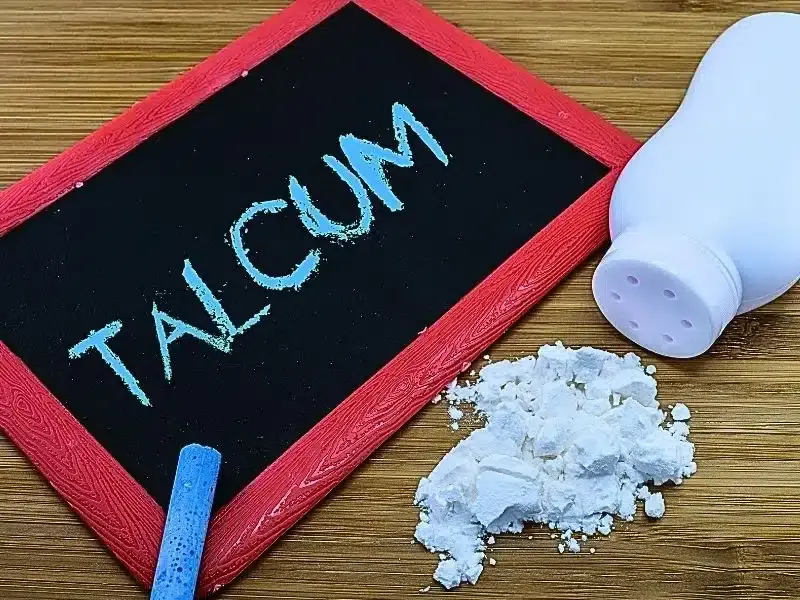
Diagnosed with ovarian cancer or mesothelioma after talcum powder use?
Call Now
Johnson & Johnson (J&J) faces nearly 50,000 talcum powder lawsuits through multidistrict litigation (MDL) cases, as a growing number of people claim that they received a cancer diagnosis following their use of J&J’s talcum powder-based baby powder product, along with products from other manufacturers and suppliers.
What Is Talcum Powder?
Talcum powder is a type of powder made from talc, which is a mineral comprising oxygen, magnesium, silicon, and other substances. Various products use this powder because of its resistance to friction and ability to absorb moisture.
Talcum powder has several potential uses, including:
- Baby powder
- Makeup products
- Pressed powder
- Pills and tablets
- Food items
Talcum Powder and Its Links to Cancer
Recent studies have found links between the use of talcum powder and cancer, including the use of baby powder products from manufacturer J&J and other companies. These links have coincided with a growing number of instances of cancer in people using talc-based products, making it important to understand the dangers of talc powder for women and children, along with others who may have endured exposure to potentially harmful talc particles.
While many talcum powder products don’t contain asbestos, those that do could potentially lead to the development of cancers.
Current Talcum Powder Lawsuits
Approximately 50,000 lawsuits have developed against J&J for talcum-based products that may have caused cancer in consumers, and the talc cancer lawsuits continue to mount as more cases of cancer coincide with the use of these products.
In addition to Johnson & Johnson, there are several other brands named in talcum powder lawsuits, including Cashmere Bouquet, Gold Bond, Whittaker, and Vanderbilt Materials. Many cases have popped up across the U.S., with most falling under the multidistrict litigation (MDL) case against J&J.

Who Is Eligible to File a Talcum Powder Lawsuit?
You may still be able to file a talcum powder lawsuit against a manufacturer or supplier like J&J if you have developed mesothelioma or ovarian cancer after consistently using talcum powders or other talc-based products. Whether you’re someone who’s used consumer-based products or worked in an industrial setting where asbestos and talc exposure put you at risk, you may be able to file a lawsuit.
If a loved one died as the result of cancer, and you suspect talc-based asbestos exposure was the cause, you could also file a wrongful death lawsuit against a liable party. However, if you want to file a wrongful death case, you must keep in mind the statute of limitations for these cases. Typically, the statute of limitations is two years from the time of the death of the cancer patient, meaning you have two years from the time of your loved one’s death to file a lawsuit.
Call Now
How Can Plaintiffs Prove That Their Talcum Powder Use Is Linked to Their Health Issues?
To succeed with a lawsuit and recover talcum powder lawsuit settlements, plaintiffs in these cases must be able to prove that talc-based powder products or industrial conditions caused mesothelioma, ovarian cancer, or endometrial cancer.
Specifically, you will need to show that you used a talcum-based product regularly for a minimum of one year and that you have received a relevant cancer diagnosis within the last three years. In the process, you may collect evidence that proves the various damages you sustained because of your health issues.
Types of Damages
There are multiple types of damages that plaintiffs may be able to recover in the talcum powder lawsuits against J&J and other companies.One of the main types of damages is economic, which pertains to the financial losses that victims suffered because of a cancer diagnosis. Examples of these damages could include medical costs of treating the cancer, lost income resulting from time off to recover and receive treatment, lost earning capacity, and other related expenses.
Meanwhile, victims may also be able to recover non-economic damages in these cases, which involve the pain and suffering and personal losses resulting from cancer diagnoses. For instance, some people may suffer serious physical pain and psychological distress, and many cancer patients experience a loss of enjoyment of life.
Some cases have also involved punitive damages.
Judges award these damages if defendants were aware of the dangerous asbestos content in their products and failed to warn consumers of the dangers and/or failed to take proper steps to minimize asbestos content. In fact, according to recent reports, J&J was aware of and had conducted research into the asbestos found in its talcum powder products.
Time Limitations for Filing a Talcum Powder Lawsuit
As mentioned, you have a specific amount of time to file a lawsuit according to your state’s statute of limitations. If you wish to file any type of tort case, you typically have two years from the time of the discovery of your illness (or the death of a loved one) to file a suit with the appropriate court.
If you want to increase your chances of succeeding with a talcum powder lawsuit, consider consulting a mass torts lawyer to discuss a potential case. An attorney can meet with you to determine the viability of a lawsuit in your case and update you on the latest news about these particular cases.
What Is the AFFF Firefighting Foam Lawsuit?
The AFFF firefighting foam lawsuit has emerged as a critical legal battleground, addressing the environmental and health repercussions of Aqueous Film-Forming Foam (AFFF) usage. Employed to combat flammable liquid fires, the foam contains per- and polyfluoroalkyl substances (PFAS) associated with adverse health effects and persistent environmental contamination. We are currently screening potential claimants for ongoing lawsuits. If you or a loved one may be eligible, contact us today for more information.
Mesothelioma & Asbestos Trust Funds
As of 2024, approximately $30 billion remains in the active trust funds set up to compensate victims after the landmark decisions of the 1980s. These lawsuits sought to hold asbestos manufacturers and companies accountable for negligence, often involving exposure in workplaces, homes, or consumer products. Compensation is available for for medical expenses, lost wages, pain and suffering, and sometimes punitive damages. Contact us today if you or a loved one developed mesothelioma after asbestos exposure.
What Is the NEC Lawsuit?
NEC (Necrotizing Enterocolitis) lawsuits involve claims against baby formula manufacturers, alleging that their products, specifically cow’s milk-based formulas like Similac and Enfamil, caused premature infants to develop NEC. Plaintiffs argue that the manufacturers failed to warn of the risks associated with their products and continued to market them as safe alternatives to breast milk despite evidence linking them to NEC. The lawsuits seek compensation for medical expenses, pain and suffering, and other damages. Contact us today for more information.
Attorney Advertisement: Do not rely on this advertisement in making any medical decision. Please call your physician before making any medical decision, including altering your use of any drug. This advertisement is not intended as a testimonial or endorsement, and does not constitute a guarantee, warranty, or prediction regarding the outcome of your legal matter, either express or implied. Non-attorney spokesperson. Anyone considering a lawyer should independently investigate the lawyers’ credentials and ability, and not rely upon advertisements or self-proclaimed expertise. Court costs and expenses may be the responsibility of the client. Wagstaff Law Firm, 940 N. Lincoln Street, Denver, Colorado 80203. Attorneys are licensed in Colorado, California, Illinois, Missouri, and New York, and may affiliate with attorneys located in other states. Cases will not be accepted in states where attorney solicitation is prohibited.



